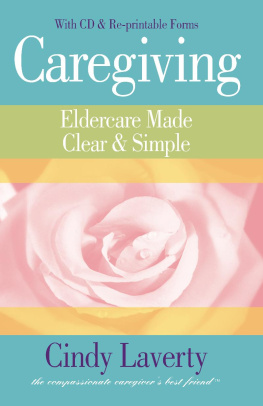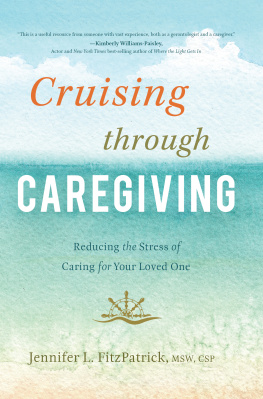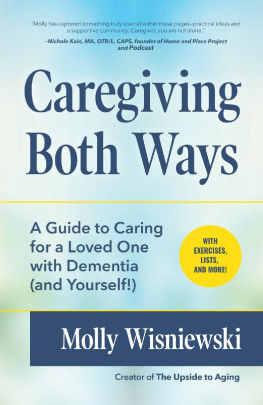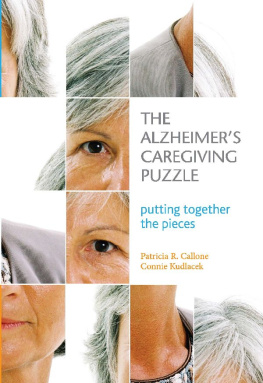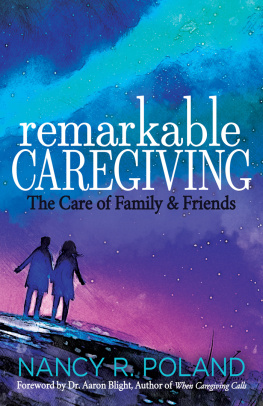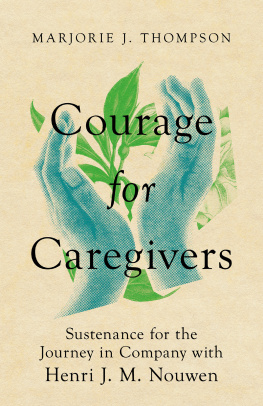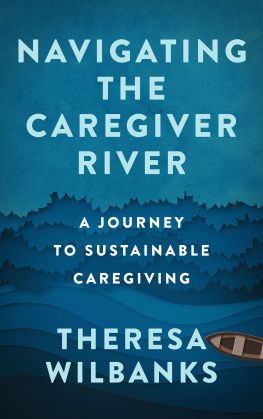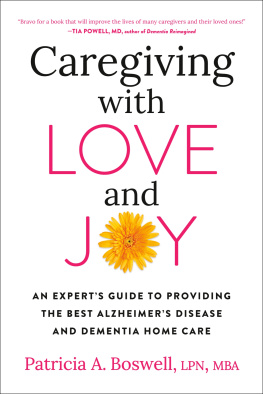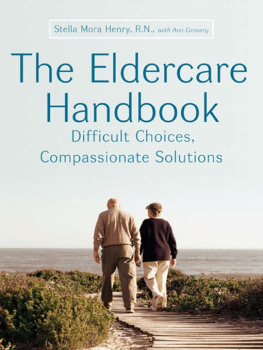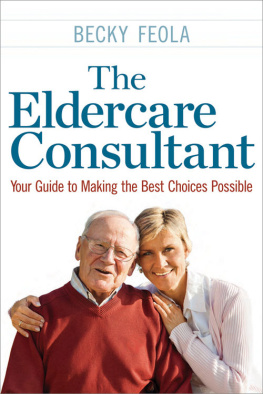Copyright 2010 by Cindy Laverty
All rights reserved.
ISBN-10: 1-937003-01-9
ISBN-13: 978-1-937003-01-2
Publish Green, Inc.
212 3rd Avenue North, Suite 290
Minneapolis, MN 55401
(612) 455-2294
www.publishgreen.com
All rights reserved. No part of this publication may be reproduced, stored in a retrieval system, or transmitted, in any form or by any means, electronic, mechanical, photocopying, recording, or otherwise, without the written prior permission of the author.
Dedication
This book is dedicated to all caregivers who search for ways to make life as seamless as possible for the elderly and who create peaceful, harmonious solutions in another human beings life.
I could not have survived without my family who always offered support, and gave me numerous free passes for bad behavior. I thank them for simply putting up with me while I was going through the process. The support and encouragement they gave me meant more than they will ever know.
And to Robert, who gave me the courage and strength to forge into areas I knew nothing about. I will always treasure this precious time in my life. Thank you, pal.
A Word From Cindy
There are thousands of books that address the subject of care-giving, and I have read a good number of them. I list some of the most valuable at the end of this manual. I wanted to create a useful guide that was based on my personal experiences and I wanted this information to be simple and concise because, if you are a caregiver or think you will become one, the last thing you want to do at the end of the day is read a book on this subject. The truth is that I read most of these books long after the circumstances that provided me with this expertise. I had no time. I needed something functional and I needed help. I needed to escape, and books on caregiving were not the answer for me.
This is a care guide that is designed to be adaptable. Caregiver needs change over time and some sections may seem unnecessary now, but may be helpful in the future.
Please let me know if the ideas and forms work for you, and send me your suggestions. I am always looking for improvements and I welcome your feedback.
Please, email me at: Cindy@thecarecompany.biz.
Cindy Laverty
Introduction
If you are in a position to use this manual, you can take comfort in knowing that you are not alone. The subject of caring for our aging population is commonplace in all social circles. Everyone is affected by the need to provide proper care delivered with dignity and respect to our aging population. Few of us know what to do.
Several years ago, I was one of those people literally thrown into a situation I knew nothing about. I was asked by my former father-in-law, Bob, (with whom I had a close relationship) to pay his bills and check on his wife (who suffered from severe arthritis and dementia) while he had open-heart surgery at eighty-three years of age. His reason for having such invasive and risky surgery was so he could see his granddaughter (my daughter) graduate from college and, as he said to me, Without this operation, I wont make it.
You can imagine the impact of such a statement. I agreed without giving it any further thought, never imagining that I would someday write a manual designed to help others in similar situations who do not know where to get help. I naively thought this promise to help out would be a minor investment of my time. For a number of complicated reasons, I was the only person who was capable of stepping forward to care for Bob and his wife, and I was honored that he trusted me to handle this role. Im certain that neither of us realized the impact it would have on both of our lives and our relationship.
Even though we shared a close relationship, I was, aware enough to know that, if I were to have control of a checkbook that didnt belong to me, I wanted and needed to have proper legal forms in place. I had to be bulletproof or as bulletproof as possible. Bob and I met with his family attorney and, with the signing of a couple of documents and the signature and stamp of a notary, we made the arrangement legal. I still knew nothing about this process and its a good thing I didnt, because I probably would never have taken it on. This is not meant to scare you, only to point out that you need to be prepared!
The fourteen-hour operation was only the beginning of what became the most fascinating education of my life. I knew nothing of the geriatric world or the needs of those living in it. I learned quickly about hospitals, doctors, nurses, protocols, bureaucracy, insurance forms, Medicare, prescription drugs, and how to manage them. I learned how easy it is to get lost in this system and, consequently, I spent a good portion of the first year learning how to avoid being abused by the system. My learning curve had to be swift and precise. I was fortunate in that I was dealing with wonderful doctors who truly cared about their patient, but they were still doctors with very little extra time. It was quickly evident that chitchat was not going to be a part of this process. I had to ask questions and be clear. Clarity is key to success.
My agreement to pay bills and check on Bobs wife turned very quickly into a full-time obligation. She was suffering from severe dementia and her caregivers were not properly caring for her. The key to keeping her in a peaceful, unagitated state was the proper administration of her medications, which required special attention. The house was in disrepair.
The staff needed replacement. The new staff needed training. The bills needed attention. Past due bills needed immediate attention. Visits to the hospital were daily; morning and early evening, with emergencies added to the mix. After a few weeks I managed to create a schedule that worked for everyone, with the exception of me.
Then, it happened. The doctors had warned that it might and it did. A stroke. Not a major, life-threatening stroke, but a debilitating stroke, nonetheless. Everything changed and Bobs recovery would be all the more difficult. Suddenly he was off to a new hospital where no one knew him, and everything was unfamiliar. He would have to rehabilitate in a new facility. Depression slowly set in as he worked to improve his functionality, while knowing that the activities he once participated in were no longer a part of his life. After a month of rehab, he returned home.
My responsibility didnt stop here. There were numerous medical issues to deal with: insomnia, depression, seizures, weakness, incontinence, functionality, balance, and the overall day-to-day challenges that the elderly experience when life begins to take its toll on the body.
Clearly, my role was not going to be temporary. If you had told me many years ago that Id be a caregiver for my ex-father-in-law, I would have thought you were crazy. But this became my life. I didnt have time to think about the consequences of this change for me; I had work to do and I wasnt going to let him down. I was on call 24/7, 365 days a year. I visited him daily. Sometimes we had beautiful visits with laughter and remembrances, and then there were those other days when he was just mad at the world and I received the brunt of his anger (does any of this sound familiar to you?). There were days when he just sat and stared into space and I read or chatted (for what seemed like endless amounts of time) just to fill the air with sound. I learned never to take his mood swings personally. I learned to look past the day-to-day feelings and try to focus on the beauty of what we brought to each others lives. My life today is truly rich because the Universe presented itself to me in a way that I was never expecting. I learned a million little things from being a caregiver. I learned to celebrate how blessed my life is because of giving to another.
Next page
